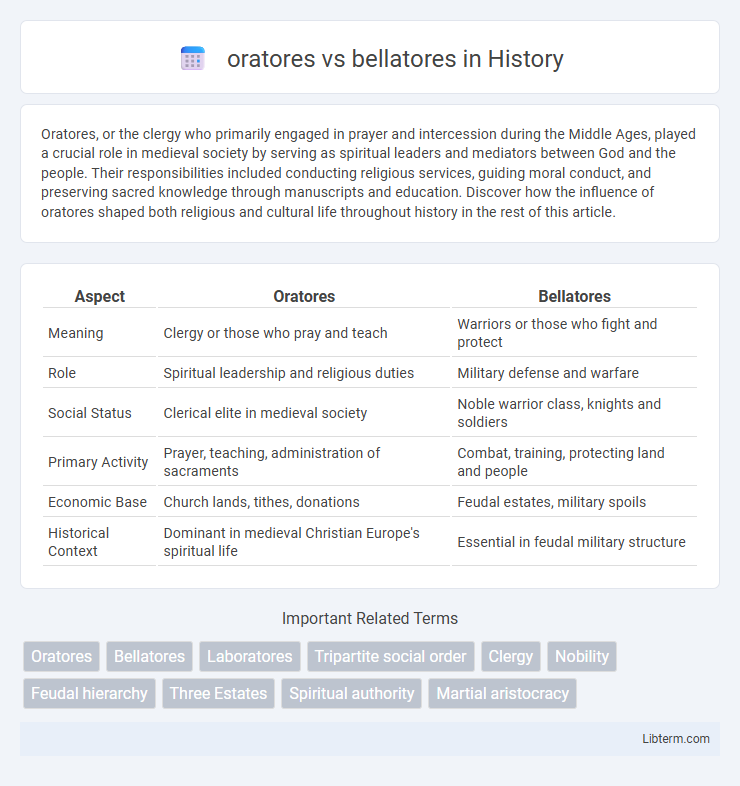Oratores, or the clergy who primarily engaged in prayer and intercession during the Middle Ages, played a crucial role in medieval society by serving as spiritual leaders and mediators between God and the people. Their responsibilities included conducting religious services, guiding moral conduct, and preserving sacred knowledge through manuscripts and education. Discover how the influence of oratores shaped both religious and cultural life throughout history in the rest of this article.
Table of Comparison
| Aspect | Oratores | Bellatores |
|---|---|---|
| Meaning | Clergy or those who pray and teach | Warriors or those who fight and protect |
| Role | Spiritual leadership and religious duties | Military defense and warfare |
| Social Status | Clerical elite in medieval society | Noble warrior class, knights and soldiers |
| Primary Activity | Prayer, teaching, administration of sacraments | Combat, training, protecting land and people |
| Economic Base | Church lands, tithes, donations | Feudal estates, military spoils |
| Historical Context | Dominant in medieval Christian Europe's spiritual life | Essential in feudal military structure |
Introduction to Oratores and Bellatores
Oratores and Bellatores represent two distinct medieval social classes with contrasting roles: oratores, the clergy, were responsible for spiritual guidance, prayer, and maintaining religious rituals, while bellatores, the warriors or knights, held military power and defended territories. The oratores wielded influence through the Church, shaping moral and ethical norms, whereas bellatores focused on physical power and protection in feudal society. Understanding this division highlights the complementary roles that structured medieval hierarchy and governance.
Historical Context of Oratores and Bellatores
Oratores and Bellatores represent distinct social orders in medieval European society, with Oratores embodying the clergy and religious leaders responsible for spiritual guidance and education, while Bellatores comprised the warrior and noble classes charged with military protection and governance. The historical context of Oratores highlights their role in maintaining ecclesiastical authority and preserving knowledge through monasteries and universities, shaping medieval culture and politics. Bellatores emerged as feudal lords and knights who upheld the feudal system by providing defense, enforcing laws, and asserting control over land and serfs during times of frequent warfare and political instability.
Definitions and Core Roles
Oratores were members of medieval society dedicated to prayer, religious duties, and maintaining spiritual welfare, typically comprising clergy and monks. Bellatores referred to the warrior class responsible for military protection, enforcing laws, and territorial defense, including knights and nobles. The division highlighted the dual roles of spiritual guidance and physical defense fundamental to feudal social structure.
Social Hierarchy in Medieval Society
Oratores and bellatores represented two fundamental classes within the medieval social hierarchy, where oratores comprised the clergy responsible for spiritual leadership, education, and maintaining religious authority. Bellatores, the warrior nobility, controlled military power, land ownership, and governance through feudal obligations. This division underscored a societal balance, with oratores mediating moral guidance and bellatores enforcing protection and political control.
Duties and Responsibilities of Oratores
Oratores, the clergy and religious leaders, held duties centered on spiritual guidance, prayer, and conducting religious ceremonies to maintain divine favor and social order. Their responsibilities included interceding for the community through prayer, offering counsel based on moral and theological principles, and preserving knowledge through teaching and scriptural study. Unlike bellatores, who focused on military defense and physical protection, oratores served as mediators between the divine and the people, ensuring the spiritual well-being of society.
Functions and Obligations of Bellatores
Bellatores, traditionally recognized as the warrior class in medieval society, held the primary function of defending the realm through military service and maintaining order within their territories. Their obligations included leading armed forces during conflicts, protecting vassals and serfs, and upholding the laws established by ruling authorities. Unlike oratores, whose roles centered on spiritual guidance and clerical duties, bellatores were essential in enforcing sovereignty and ensuring the physical security of the political structure.
Interaction and Relationship Between the Two Orders
The interaction between oratores (those who pray) and bellatores (those who fight) was characterized by mutual dependence in medieval society, where oratores provided spiritual support and legitimacy to bellatores through prayers and religious rituals. Bellatores, in turn, protected the lands, churches, and communities that supported the oratores, ensuring their safety and ability to perform religious duties. This reciprocal relationship reinforced the social hierarchy, with both orders acknowledging their distinct but complementary roles in maintaining societal stability.
Influence on Culture and Governance
Oratores, or clergy, shaped culture and governance through spiritual and intellectual authority, promoting education, moral values, and legal foundations rooted in religious doctrine during the Middle Ages. Bellatores, or warriors, influenced power structures and governance by enforcing law and order, defending territories, and enabling centralized control through military strength. The dynamic between oratores and bellatores created a balance of ideological guidance and physical power that deeply impacted medieval European political and cultural institutions.
Conflicts and Cooperation in Medieval Europe
Oratores and bellatores represented the dual pillars of medieval European society, where oratores (clergy) often mediated conflicts while bellatores (warriors) executed military power. Conflicts frequently arose due to competing interests over land and authority, yet cooperation was essential as oratores legitimized bellatores through religious sanction and moral guidance, fostering social order. This interdependence shaped the feudal system, balancing spiritual influence with martial enforcement for stability in medieval Europe.
Legacy of Oratores and Bellatores in Modern Society
Oratores, the clergy and intellectuals, shaped modern society through the preservation of knowledge, education systems, and moral frameworks that underpin contemporary governance and legal systems. Bellatores, the warrior class, influenced modern concepts of state sovereignty, military organization, and justice enforcement, forming the basis of national defense and law enforcement institutions. The interplay between oratores and bellatores established the early foundations of social order, combining intellectual authority with martial power in shaping political and cultural legacies still evident today.
oratores Infographic

 libterm.com
libterm.com